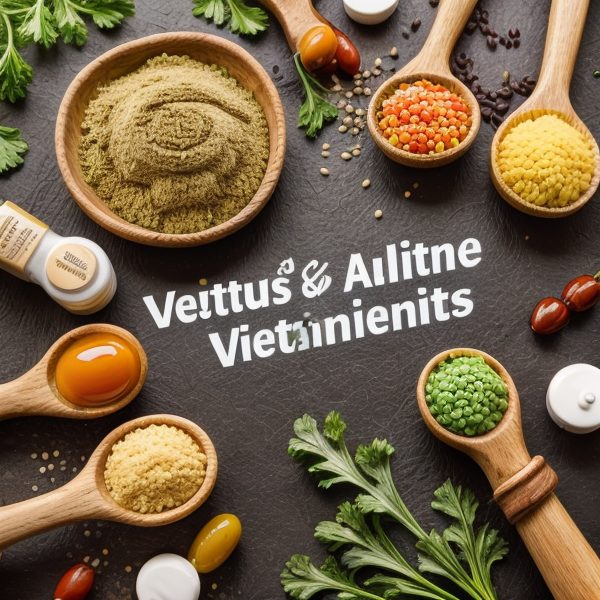Essential Vitamins and Minerals for Vegans and Vegetarians

Title: Essential Vitamins and Minerals for Vegans and Vegetarians
Introduction
Following a vegan or vegetarian diet can be a healthy and nutritious way of life, but it’s important to make sure you’re getting all the essential vitamins and minerals your body needs. While many people believe that plant-based diets lack certain nutrients, this doesn’t have to be the case if you plan ahead and include a variety of whole foods in your meals. In this article, we’ll discuss some key nutrients that vegans and vegetarians should prioritize, as well as tips on how to incorporate them into your daily diet.
Vitamin B12
Vitamin B12 is an essential water-soluble vitamin that plays a crucial role in red blood cell formation, DNA synthesis, and neurological function. It is primarily found in animal products such as meat, fish, eggs, and dairy products. Since these are not part of a vegan or vegetarian diet, it’s important to find alternative sources. Fortified foods like plant-based milks, cereals, and nutritional yeast are excellent sources of vitamin B12. You can also consider taking a supplement if you’re concerned about meeting your daily requirements.
Calcium
Calcium is another important nutrient that is often associated with dairy products. However, there are plenty of plant-based sources of calcium that can help meet your daily needs. Some good options include fortified plant-based milk (such as almond, soy, and oat), leafy green vegetables like kale and broccoli, tofu processed with calcium sulfate, and sesame seeds. It’s also important to note that while these foods contain calcium, they may not provide the same bioavailability as dairy products. This means that your body may not absorb the calcium from plant-based sources as efficiently as it does from dairy. To ensure adequate absorption, consider consuming vitamin D along with your calcium sources.
Iron
Iron is an essential mineral that helps transport oxygen throughout the body. While iron is abundant in animal products, it can be more challenging to obtain sufficient amounts from plant-based sources. However, there are still several plant-based foods that are rich in iron, including lentils, beans, spinach, chickpeas, tofu, and tempeh. To increase the bioavailability of non-heme iron (found in plants) consume these foods with vitamin C-rich foods like citrus fruits, tomatoes, bell peppers, and berries. Additionally, you can consider cooking in cast iron cookware, which has been shown to enhance the absorption of iron.
Omega-3 Fatty Acids
Omega-3 fatty acids are essential polyunsaturated fats that play a crucial role in heart health, brain function, and inflammation. While omega-3s are commonly found in fatty fish, they can also be obtained from plant-based sources such as flaxseeds, chia seeds, walnuts, and canola oil. However, the form of omega-3s found in plant-based sources (ALA) is not as readily converted into the active forms EPA and DHA as the form found in fish. If you’re looking to boost your intake of EPA and DHA, consider taking an algae-based supplement or including small servings of fatty fish in your diet.
Protein
Protein is an essential macronutrient that helps build and repair tissues in the body. While animal products are a common source of protein, there are plenty of plant-based proteins available as well. Some great sources of plant-based protein include beans, lentils, tofu, tempeh, edamame, quinoa, and nuts and seeds. When combining plant-based proteins, it’s important to keep in mind the “protein complementarity principle.” This means that different plant-based foods contain different amino acid profiles, and by consuming a variety of these foods together, you can ensure that you’re getting all the essential amino acids your body needs.
Other Important Nutrients
In addition to the above mentioned vitamins and minerals, there are several other nutrients that vegans and vegetarians should prioritize. These include:
Zinc: Found in legumes, nuts, seeds, and whole grains.
Vitamin D: Can be obtained through sun exposure and fortified foods.
Iodine: Primarily found in iodized salt and seaweed.
Vitamin K: Abundant in leafy greens, cruciferous vegetables, and fermented foods.
Choline: Rich in egg yolks, liver, and cruciferous vegetables.
Selenium: Found in Brazil nuts, brown rice, and other whole grains.
Manganese: Plentiful in leafy greens, beans, and whole grains.
Chromium: Present in whole grains, broccoli, and potatoes.
Molybdenum: Contained in legumes, leafy greens, and whole grains.
Tips for Incorporating Essential Nutrients
Now that you know which nutrients to prioritize, here are some tips for incorporating them into your daily diet:
Plan ahead: Make sure to include a variety of whole foods in your meals and snacks throughout the day. Plan your meals around plant-based protein sources, such as beans, lentils, and tofu.
Experiment with new recipes: Try incorporating new plant-based ingredients into your favorite dishes or search for recipes specifically designed for vegans and vegetarians.
Supplement wisely: Consider taking a high-quality multivitamin and individual supplements as needed to fill any nutrient gaps. Always consult with a healthcare professional before starting any new supplement regimen.
Get creative with seasoning: Use herbs and spices to add flavor to your meals without relying on salt or processed sauces.
Stay hydrated: Drink plenty of water throughout the day to support overall health and aid in digestion.
Be mindful of portion sizes: Pay attention to serving sizes and adjust accordingly to meet your individual calorie needs.
Consider working with a registered dietitian: A registered dietitian can help you create a personalized eating plan that meets your unique nutritional needs and preferences.
Remember, following a vegan or vegetarian diet can be a delicious and nutritious way of life. By prioritizing essential vitamins and minerals, planning ahead, and staying informed, you can ensure that you’re getting everything your body needs to thrive.
